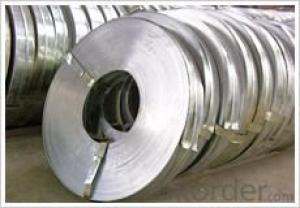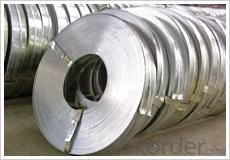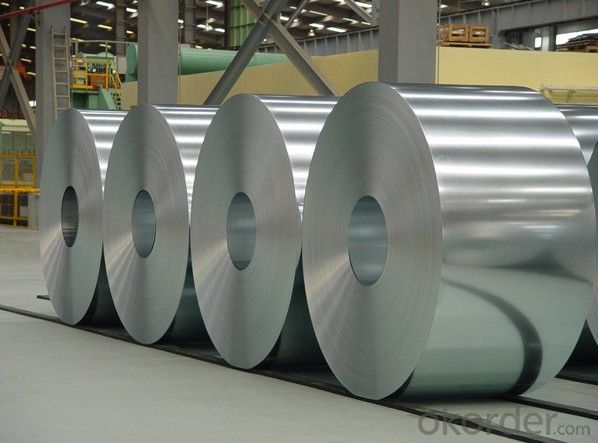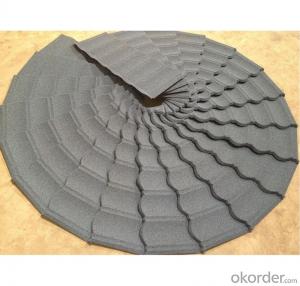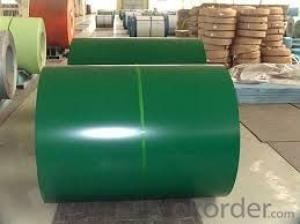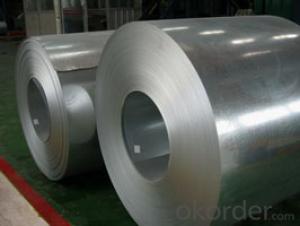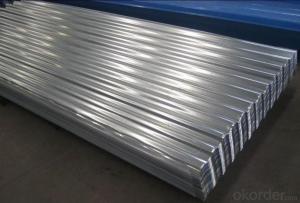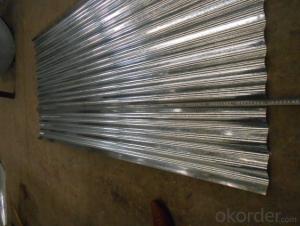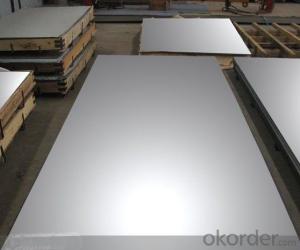Prime quantity Galvanized Steel Coils/Sheets, CNBM
- Loading Port:
- China main port
- Payment Terms:
- TT OR LC
- Min Order Qty:
- 1 m.t.
- Supply Capability:
- 100000 m.t./month
OKorder Service Pledge
OKorder Financial Service
You Might Also Like
Hot dip galvanized steel coil and sheet | |
Technical Standard: | JIS 3302 / ASTM A653 / EN10143 |
Grade | DX51D / DX52D/ DX53D/ S250,280,320GD |
Types: | Commercial / Drawing / Deep Drawing / Structural quality |
Width | 500/650/726/820/914/1000/1200/1219/1220/1250mm |
Thickness | 0.12-4.0mm |
Type of coating: | Galvanized |
Zinc coating | Z30-700g/m2 |
Surface Treatment | Chromed / Skin-pass/ Oiled/Slightly Oiled/ Dry/ Anti-fingerprint |
Surface structure: | Zero spangle / minimized spangle / regular spangle/ big spangle |
ID coil | 508mm or 610mm |
Coil weight | 3-12 MT per coil |
Package: | Properly packed for ocean freight exportation in 20''containers |
Application: | Industrial panels, roofing and siding for painting |
Price terms | FOB,CFR,CIF |
Payment terms | T/T or L/C |
Delivery time | Within 30 days |
Remarks | Insurance is all risks |
MTC will be handed on with shipping documents | |
We accept the third party certification test,such as SGS/BV |
Technical data :
Hot dipped galvanized coil Technical Data
Chemical Composition | ||||||
GRADE | C | Si | Mn | P | S | Ti |
SGCC/DX51D+Z | ≤0.10 | ≤0.50 | ≤0.60 | ≤0.10 | ≤0.030 | ≤0.020 |
DX52D+Z | ≤0.10 | ≤0.50 | ≤0.60 | ≤0.10 | ≤0.030 | ≤0.020 |
SGCD/DX53D+Z | ≤0.10 | ≤0.30 | ≤0.50 | ≤0.05 | ≤0.030 | ≤0.020 |
SGCE/DX54D+Z | ≤0.10 | ≤0.30 | ≤0.30 | ≤0.03 | ≤0.020 | ≤0.020 |
DX56D+Z | ≤0.10 | ≤0.30 | ≤0.30 | ≤0.03 | ≤0.020 | ≤0.020 |
Structural | ≤0.20 | ≤0.60 | ≤1.70 | ≤0.10 | ≤0.045 | |
Hot dipped galvanized steel coil Mechanical Properties | |||
GRADE | Yield Strength MPa | Tensile Strength MPa | Elongation % |
SGCC(DX51D+Z) | ≥205 | ≥270 | - |
SGCD(DX53D+Z) | - | ≥270 | 38 |
SGCE(DX54D+Z) | - | ≥270 | 40 |
DX56D+Z | - | ≥270 | 42 |
- Q: Can the steel sheets be used for decorative purposes?
- Certainly, decorative purposes can be fulfilled by steel sheets. Customization and shaping of steel sheets into an array of designs, patterns, and sizes enable their suitability for diverse decorative applications. They are ideal for crafting distinctive and contemporary architectural elements like ornamental facades, decorative wall panels, or intricate metal screens. Moreover, steel sheets find utility in decorative furniture, art installations, and sculptures. Their popularity stems from their versatility, durability, and sleek appearance, which effortlessly infuse spaces with elegance and sophistication, both indoors and outdoors.
- Q: Are the steel sheets resistant to impact or denting?
- Yes, steel sheets are highly resistant to impact and denting. Steel is known for its exceptional strength and durability, making it one of the most reliable materials for various applications. The inherent properties of steel, such as its high tensile strength and toughness, provide excellent resistance against impact and denting. Additionally, steel sheets can be further enhanced with special coatings or treatments to increase their resistance to impacts or dents, making them even more reliable in demanding environments. Overall, steel sheets are a preferred choice for applications where impact resistance and denting are significant concerns.
- Q: What is the average lifespan of steel sheets used for roofing?
- The lifespan of steel sheets used for roofing can vary based on several factors. Nevertheless, high-quality steel roofing sheets are designed to be extremely durable and long-lasting. On average, these steel sheets can endure for 40 to 70 years or potentially even longer if properly maintained and cared for. The longevity of steel roofing sheets can be influenced by factors such as the steel type and thickness, the coating or finish quality, the climate and weather conditions in the area, and the level of maintenance. Conducting regular inspections, cleaning, and repairs as necessary can help extend the lifespan of the steel sheets and ensure their good condition for many years. It is always advisable to seek guidance from roofing professionals or manufacturers for specific guidelines and recommendations regarding the lifespan of steel sheets used for roofing in a particular context.
- Q: Can steel sheets be painted or coated?
- Yes, steel sheets can be painted or coated. Painting or coating steel sheets can provide protection against corrosion, improve aesthetics, or serve specific functional purposes such as heat resistance or electrical conductivity.
- Q: What is the typical fatigue strength of a steel sheet?
- The typical fatigue strength of a steel sheet depends on various factors such as the steel grade, thickness, surface condition, and the specific loading conditions. It is usually determined through fatigue tests conducted under controlled laboratory conditions. Therefore, it is difficult to provide a specific value without considering these variables.
- Q: What are the different surface textures for galvanized steel sheets?
- The different surface textures for galvanized steel sheets include smooth, matte, and patterned textures.
- Q: Are steel sheets suitable for playground equipment?
- Indeed, playground equipment can be made using steel sheets. Steel is a robust and enduring substance that can endure extensive use, offering a secure playing environment for children. Steel sheets are versatile and can be utilized to build an array of playground equipment, ranging from slides to climbing structures and swing sets. Moreover, steel is impervious to weather conditions, rendering it an ideal selection for outdoor playgrounds. The material can be effortlessly molded and formed into various designs, providing room for innovation and personalization in playground equipment. All in all, steel sheets are a dependable and enduring choice for playground equipment, guaranteeing children's safety and enjoyment.
- Q: Can steel sheets be used for outdoor sculptures?
- Yes, steel sheets can be used for outdoor sculptures. Steel is a durable and weather-resistant material, making it suitable for withstanding outdoor elements. Additionally, steel sheets can be easily manipulated and shaped to create various forms and designs, making them a popular choice for outdoor sculpture projects.
- Q: How are steel sheets protected against rusting?
- Corrosion protection is employed to safeguard steel sheets against rusting. Several techniques are utilized for this purpose: 1. Galvanization: Zinc is applied as a coating on the steel sheets. Acting as a sacrificial anode, the zinc corrodes in lieu of the steel when exposed to moisture or oxygen. Consequently, a barrier is formed to shield the steel from rust. 2. Painting: A layer of paint is applied to the steel sheets, creating a protective barrier against moisture and oxygen. This physical barrier prevents contact between these elements and the steel, thus reducing the likelihood of rust formation. 3. Powder coating: Dry powder is spread onto the steel sheets and then heated to establish a protective layer. The powder liquefies and fuses into a smooth coating, offering remarkable resistance to rust and corrosion. 4. Electroplating: The steel sheets are immersed in a bath containing a metal coating solution, such as zinc or chromium. By passing an electric current through the bath, the metal coating bonds with the steel, serving as a safeguard against rust. 5. Phosphating: A chemical process deposits a layer of zinc or manganese phosphate onto the steel sheets. This layer enhances the adhesion of paint or other coatings, providing a surface resistant to corrosion. These techniques find widespread usage in various industries to avert the rusting of steel sheets. The selection of a specific method is contingent upon factors such as cost, durability requirements, and the intended environment for the steel sheets.
- Q: Can steel sheets be used for decorative wall panels?
- Yes, steel sheets can be used for decorative wall panels. Steel sheets offer a modern and sleek appearance, and their durability makes them suitable for both interior and exterior applications. They can be customized with various finishes, textures, and patterns to create unique and visually appealing wall panels.
Send your message to us
Prime quantity Galvanized Steel Coils/Sheets, CNBM
- Loading Port:
- China main port
- Payment Terms:
- TT OR LC
- Min Order Qty:
- 1 m.t.
- Supply Capability:
- 100000 m.t./month
OKorder Service Pledge
OKorder Financial Service
Similar products
Hot products
Hot Searches
Related keywords
